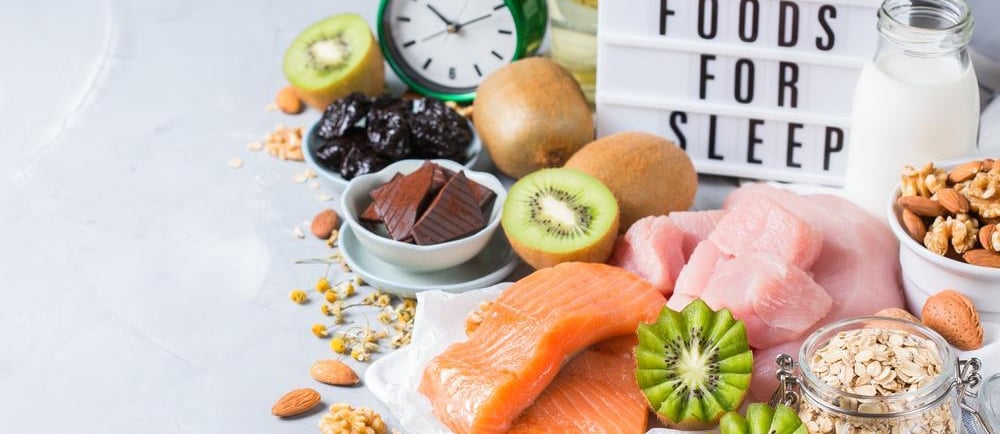Eating for Sleep: The Anti-Insomnia Diet
The food you eat does more than simply sustain you. The nutrients you consume play a vital role in the chemical reactions of each and every bodily function. A healthy and balanced diet is an essential part of maintaining optimal mental functioning
SLEEPHOLISTIC MENTAL HEALTH
Medically Reviewed by Chelsey Lahr, PMHNP-BC
8/3/20244 min read


The food you eat does more than simply sustain you. The nutrients you consume play a vital role in the chemical reactions of each and every bodily function. A healthy and balanced diet is an essential part of maintaining optimal physical and mental functionality, and many health irregularities can be helped by taking a closer look at your eating habits.
Sleep is one of the most important physiological processes that we undergo, yet it is also one of the most neglected. Millions of people worldwide suffer from the common sleep disorder insomnia. Sufferers of insomnia have trouble falling asleep and staying asleep, and often go through their days in a haze of exhaustion. This disorder can be debilitating, as a healthy sleep cycle is imperative for good health and wellbeing. Disrupted sleep can lead to irritability, heart and blood pressure problems, depression, and a weakened immune system.
While there are medications you can take to help you sleep, many of these come with unwanted side effects. One of the most effective treatments for insomnia is a change in lifestyle. Part of this is a dietary overhaul. By paying attention to the nutrients that you put into your body and making some changes to what and when you eat, you can get a head start on a good night's sleep.
The sleep cycle is controlled by many different chemicals, enzymes, nutrients, amino acids, and hormones all working in conjunction with one another. Certain foods and drinks contain compounds that regulate the sleep cycle by assisting with the production of sleep-inducing chemicals. Other foods may exacerbate sleeplessness by hindering the production of these chemicals, or by causing gastrointestinal discomfort. An effective anti-insomnia diet focuses on fresh fruits and vegetables, lean protein, and unsaturated fats, and avoids alcohol, caffeine, sugar, and spicy and greasy foods.
What to eat
Melatonin is the chemical responsible for sleep. It is produced by the pineal gland and functions as both a hormone and a neurotransmitter. Melatonin production is regulated by light. It increases in the evening and decreases in the morning signaling to the body that it is time to either go to bed or to wake up. Some people choose to take an over the counter melatonin supplement to help combat their insomnia, but it is possible to get melatonin directly from food.
Tart cherries are one of the richest natural sources of melatonin and drinking one cup of tart cherry juice twice a day has been proven to reduce insomnia. Cherries are also rich in antioxidants, which help combat the oxidative stress caused by disordered sleep. Other fruits and vegetables that contain melatonin are organic corn, tomatoes, pomegranate, grapes, broccoli, olives, and cucumber. Melatonin is also found in some grains, such as rice, and in many nuts and seeds. Walnuts are the next biggest dietary source of melatonin after cherries.
The nutrients involved in the production of melatonin can also be found in food. Tryptophan is an amino acid found in lean protein sources such as dairy, poultry, eggs and seafood. It is an essential ingredient in the body's recipe for serotonin, which is later converted into melatonin. Turkey is a particularly good source of tryptophan, and this Thanksgiving delicacy has gained a reputation for inducing sleep. Your body needs carbohydrates to produce tryptophan, so foods in moderation such as pasta, bread, rice, and potatoes can also help you sleep soundly.
Calcium is another mineral that assists in melatonin production, and a diet high in calcium can help prevent sleepless nights. Dairy products are particularly good at helping insomnia because they are a source of both calcium and tryptophan. Dark leafy greens such as spinach are also a good source of calcium, not to mention magnesium, a powerful mineral that acts as a natural relaxant and aids deep sleep. Bananas are also packed with magnesium, as well as with potassium, a natural muscle and nerve relaxant.
Nuts and seeds, fish, and avocados are some healthy foods that are rich in magnesium. The unsaturated fats found in these foods contribute to the production of serotonin. They also contain plenty of vitamin B5, the lack of which can contribute to insomnia and disrupted sleep.
Drinking herbal tea as part of your nighttime routine can also help you have a restful night. Chamomile tea is particularly soothing. Be careful, though - some teas, such as black tea, are high in caffeine and will have the opposite effect!
What not to eat
When considering an anti-insomnia diet, the foods and beverages that you avoid are just as important as those which you include. Coffee, chocolate, and energy drinks all contain caffeine and should be avoided in the latter part of the day.
Many people suffer insomnia related to indigestion, acid reflux or heartburn. Spicy food is one of the biggest culprits here. The chili in spicy food also increases your body temperature, making it more difficult to fall asleep. Additionally, foods that are high in saturated fats can cause insomnia, as your body's resources are focused on digestion rather than sleep. Sugary food and junk food will have the same effect. Saturated fat also disrupts your body's levels of orexin, a neurotransmitter that regulates the sleep cycle.
Alcohol is a huge no-no when it comes to a diet for healthy sleep. While it can make you feel drowsy and even cause you to fall asleep more quickly, alcohol disrupts your circadian rhythm and prevents you from reaching the deep sleep needed for proper rejuvenation.
Following the above guidelines will not only help combat insomnia but will also encourage you to eat more mindfully, contributing to better overall mental and physical wellbeing.
Providing compassionate holistic mental health care to Colorado and Arizona.
Phone: Colorado & Arizona 719-505-4404
Copyright © 2018-2025 Intrepid Mental Wellness, PLLC. All rights reserved | Privacy Policy | Terms & Conditions


Content on this website is not considered medical advice. Please consult with a licensed health care provider before making any medical or lifestyle changes.
Holistic mind & body supplements & products
Contact |
Shop |
Fax: 720-899-3575